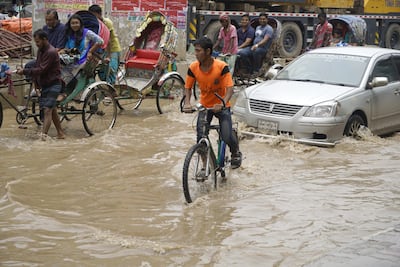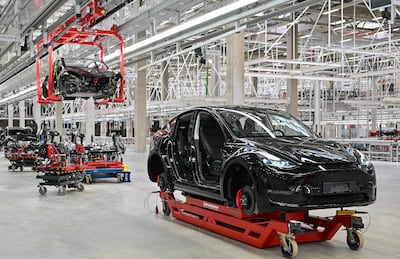With the eyes of the world turning to Glasgow as leaders discuss how to prevent a climate catastrophe, The National answers the key questions about the Cop26 summit.
Cop26 dates: When is the summit?
It runs from Sunday, October 31, until Friday, November 12.
Where is it being held?
Glasgow, Scotland. The venue is called the Scottish Event Campus (SEC) and consists of exhibition halls, an auditorium and a 14,300-seater arena.
Why Glasgow?
The UK government gets to choose the venue because it is organising this year’s summit. A different country hosts each one, typically on a rotating basis between continents.
Glasgow was chosen in 2019. Ministers described it as one of the UK’s most sustainable cities and a showcase for “diverse culture and world-leading innovation”.
Why is it called Cop26?
A UN climate summit is known as a Conference of the Parties (Cop). There have been 25 so far. That makes this one Cop26.
The “parties” in the name are the 197 signatories to a UN climate treaty, the United Nations Framework Convention on Climate Change (UNFCCC).
Cop26 was initially due to take place in 2020 but was postponed by a year because of the pandemic.
Who is attending Cop26?
Negotiators from all 197 parties – 196 countries plus the European Union – will be in Glasgow. About 25,000 people are expected to be there.
As part of the summit, world leaders are holding talks on November 1 and 2. Prime Minister Boris Johnson will represent Britain. US President Joe Biden will be there.
Chinese leader Xi Jinping is not expected to attend. But Australian Prime Minister Scott Morrison will be in Glasgow, having initially hinted he might not.
Hopes that Pope Francis would attend Cop26 appeared to be scotched when the Vatican announced that another official would lead its delegation.
Other guests will include British documentary maker David Attenborough and Swedish activist Greta Thunberg, who has expressed dissatisfaction with global progress on climate change.
Businesses, artists, young people and indigenous leaders will be among those holding events open to the public in a Cop26 Green Zone.
Why is Cop26 so important?
Most of the world signed the Paris Agreement six years ago, promising to try to limit global warming to 1.5ºC above pre-industrial levels.
Alok Sharma, the president of Cop26, has described Glasgow as the moment when the aspirations of Paris must be turned into concrete action.
The urgency of tackling climate change was made clear by a UN-backed scientific report in August which was described as a “code red for humanity”.
It said the consequences of climate change would be drastically more severe if the 1.5ºC target is breached, with floods and heatwaves far more common.
Global warming is already affecting the weather. Summer floods in Europe were widely blamed on climate change. The UN believes that drought, disease and hunger could affect millions of people. And there are concerns that conflicts over food and water could trigger fresh waves of migration.
Mr Sharma has described the summit as “our last best chance” to keep the Paris target within reach. Some experts doubt that this is possible.

What is the programme for Cop26?
World leaders will kick off the summit by setting “high-level ambition” for climate action, the UK government says.
The subsequent four days will see more in-depth discussions between delegates on finance, energy, nature and hearing the voices of young people.
After a rest day on November 7, the second week will see negotiations on adaptation, gender equality, innovation, transport and cities.
What are the priorities?
The UK has set out four priorities for climate action:
1. Reducing carbon emissions. In particular, Britain wants this to be “the Cop that consigns coal power to history” by replacing it with cleaner fuels. It also wants more investment in renewable energy and electric vehicles.
2. Protecting people and nature. It is too late to stop climate change altogether. This means building flood defences and warning systems to face the increased risk.
3. Mobilising finance. Developing countries in particular need money to go green, but a 2009 promise of $100 billion in annual support was not met.
4. Working together. Britain wants countries to co-operate on carbon pricing, transparency in reporting climate progress, and other issues.

How are negotiations progressing?
Many countries have set out plans to be carbon-neutral by the middle of the century. Britain and the EU want to ban petrol car sales sooner than that.
Under Mr Biden, the US rejoined the Paris Agreement and plans to halve emissions by 2030, but has not set a date for the end of polluting cars.
The UK gave a cautious welcome to plans by China, the world’s biggest polluter and coal user, to reach net zero by 2060.
Italy’s top G20 diplomat said recently that ambitious climate pledges were triggering a “virtuous race to the top” among countries.
But not all countries have submitted their climate plans, and an adviser to Cop26 has said that “Zoom diplomacy” is slowing progress.
Coal has been a tricky issue in negotiations so far. Talks among G20 ministers in July ended without agreement and with India signing a dissenting statement.
Finance is another thorny matter. Africa needs an estimated $3 trillion to reach its climate goals. But global budgets are strained by the pandemic.
The World Health Organisation said leaders should act to protect public health by promoting greener lifestyles such as plant-based diets.
What are the Covid-19 requirements in Glasgow?
Rejecting suggestions that Cop26 should take place virtually, Britain has taken a series of steps to help delegates come to Glasgow.
Diplomats were offered vaccines if they could not get one in their home countries. The UK taxpayer is covering the cost of quarantine hotels.
Once in Glasgow, participants will have to take daily tests. They will not have to show proof of vaccination, in a waiver from Scotland’s vaccine passport rules.
There will be limits on room capacity and delegates are encouraged to make “appropriate greetings”.
















